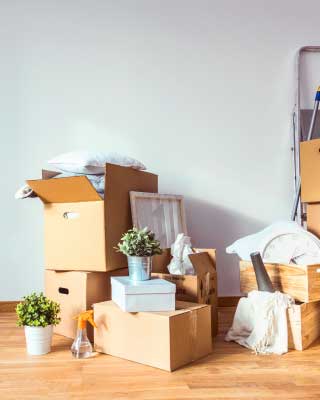- text
-
Cover and benefits are subject to eligibility criteria and terms and conditions, including the limits and exclusions of the insurance policy. Any advice provided is general only and may not be right for you. Before you purchase this product you should carefully read the Home Insurance Product Disclosure Statement and consider the Target Market Determination to decide if it is right for you.
Tips for preparing to move out of home.
Moving out of home for the first time is a pivotal experience, but it requires organisation, time, and money. If you’ve decided to take the plunge but don’t know where to start, read our 20 tips that might make moving a little easier.
1. Create a budget.
From hiring a moving van to buying new furniture, the cost of moving out of home adds up! Write down all your expenses and ensure you leave a little wiggle room for unexpected costs. Consider:
Rent
Bills (phone, electricity, WIFI, gas, water)
Petrol for moving day
Moving van/ team
Bedroom furniture (bed, desk, bedside table, lamp, wardrobe)
Other furniture (things you might need to contribute to your sharehouse).
Useful tip: if you want to get a ‘feel’ for what it might be like to manage your money out of home, start paying a bit of board in the weeks leading up to your move.
2. Picking the location.
Consider places you need to live near when picking the location of your home. Do you need to be close to work or university? What are the public transport options near your home? If you don’t drive, scope out whether there’s a train station or bus stop that’s a walkable distance away.
3. Cancel memberships.
If you’re moving away from your local gym or sports club, don’t forget to cancel your membership! Gyms usually need 30 days' written notice, so get ahead now, or you could be doubling your payments for membership in two locations.
4. Inspections.
Make sure you inspect your room before you move in. Open up the cupboards, check door handles are secure, look at the storage options and make a mental checklist of things you might need. Try to inspect during the day to see how much natural light the room gets.
5. Meet your roommates before you move in.
If you’re not moving out with friends, you should arrange a meet and greet with the people you intend to live with. You don’t want to get stuck with a bad housemate! Try to find people with similar interests and lifestyles - it will make home life a lot more comfortable.
6. Read your lease agreement carefully.
Once your tenancy application is approved, read through your rental agreement thoroughly to make sure you understand your obligations and rights as a tenant. It’s a good time to ask your future housemates and property manager any questions you might have.

7. Clear out the clutter.
What a great time to clear out all your unwanted or unused things! Whether it’s the clothes hanging in your closet that you haven’t worn in over a year or those CDs that have been sitting at the back of your shelf gathering dust. Moving house is the perfect time for a spring clean. Once you’ve finished clearing out the clutter, take stock and evaluate the value of your possessions.
8. Taking note of valuable items.
There are always special items that need to be kept safe in the move. Make sure you’ve packed and labelled these safely so you know where they are at all times. If possible, move the valuable stuff yourself to ensure it arrives safely at your new home.
9. Label your moving boxes.
Labels can be a lifesaver! Especially when it comes to loading up the moving van or truck and then unpacking. A good rule of thumb when labelling is to include the contents of the box, what room it belongs in, and if the item is breakable. An example of a useful label is “Wine glasses, Kitchen, Breakable”. That way you’ll know not to stack things on them when packing and also where to deliver the box to when you arrive at your new home.
10. Pack a bag with essentials.
Remember to pack a bag with essentials like a spare change of clothes, medication, toiletries, a phone charger, and anything else you need on an average day. You don’t want to be sifting through a sea of boxes to find something like your toothbrush!
Tips for moving day.
11. Communicate with everyone helping you move.
Don’t bottle up your stresses. Whether it’s the emotion of leaving a home or a box has gone missing, communicating how you’re feeling can be the difference between your stress levels rising and coming to a speedy solution to whatever is stressing you. A perfect scenario for when your support system will come in very handy.
12. Do a walkthrough of your new home.
This will save you a lot of time, energy, and stress. Doing a walk-through of your new home with whoever is moving your belongings means that you can let them know exactly where you want your things taken to. When your boxes are taken to the correct rooms, all you need to do is unpack them, and there’ll be no unnecessary dragging boxes from room to room.
13. Set your bed up first.
We all know moving can be exhausting - and after a day of transporting your stuff - you want to be able to get into bed and catch some well-earned Z’s. Organising and sorting your things can take several days, so make sure the most important part of your room is set up first!
Tips for settling into your new home.
14. Change your address.
Take some time to make a list of all the accounts you have, especially those that send you bills or important documents via post. These can be things like your electricity and phone provider, your doctor, or government organisations.
15. Set up bills and expenses.
We mentioned earlier that it’s a good idea to create a budget, but you can go a step further and set up scheduled and recurring payments. It’s a great way to keep on top of your bills and expenses to make sure don’t miss anything! Most banks have in-app features that can help you set this up.
16. Chore roster.
Whether three people have cooked back to back in the kitchen or your housemate hosted a movie night, everyone should pull their weight to keep the house clean. Create a chore roster that delegates different tasks to each roommate during the week to help keep everyone accountable!
17. Ask for help.
Moving out of home for the first time can be a tough feat, so don’t think you’ve got to tackle it alone! If life gets overwhelming, don’t be afraid to reach out to your support network. A quick call or facetime can reaffirm you made the right choice to become a bit more independent!

18. Splitting costs with roommates.
Keeping track of costs gets tricky if you share things like food, drinks, furniture, and bills with your roommates. Don’t sweat having to chase someone up and instead use apps like and , which offer features like instant payments, cost splitting, and direct debit.
19. Chore roster.
Whether three people have cooked back to back in the kitchen or your housemate hosted a movie night, everyone should pull their weight to keep the house clean. Create a chore roster that delegates different tasks to each roommate during the week to help keep everyone accountable!
20. Ask for help.
Moving out of home for the first time can be a tough feat, so don’t think you’ve got to tackle it alone! If life gets overwhelming, don’t be afraid to reach out to your support network. A quick call or facetime can reaffirm you made the right choice to become a bit more independent!
Contents insurance.
If you’re renting and you want to protect your valuables and possessions. It may be a good idea to take out contents insurance, which may cover you in events like theft, malicious damage, or accidental damage depending on coverage selected.




